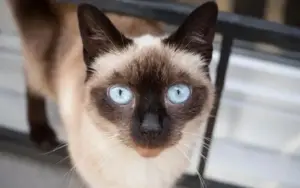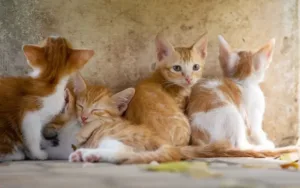Have you ever experienced this?
You wake up groggily in the middle of the night to use the bathroom. Holding your phone as a flashlight, you suddenly notice a pair of glowing eyes in the dark, staring eerily at you… Why do our pets‘ eyes glow? Is it just to scare us?
Table of Contents
Biological Night Vision
Although humans have evolved to the top of the food chain, we still have a few shortcomings—like our vision.
Not only can we suffer from issues like nearsightedness, astigmatism, and presbyopia that make it hard to see clearly, but when night falls, it’s almost as if we’re blind, which makes many people instinctively fear a „pitch-black“ environment.
However, when it comes to „night vision,“ many of our furry friends excel.
According to a recent study by the University of Wisconsin-Madison, cats have six times better night vision than humans!
And it’s well-known that dogs, whose vision isn’t as sharp and who may even be colorblind, also have night vision five times better than humans.
This means that when the ambient light at night is only 1/5 of what humans can see, both cats and dogs can still clearly see objects in the dark.
Why Do Their Eyes Glow
One of the reasons for their excellent night vision is that their eye structure is unique.
Dogs and cats have a special structure in their eyes called the tapetum lucidum (also known as the „reflective membrane“), located behind the retina, which humans do not have.
When light passes through the retina, it is reflected back by the tapetum lucidum, which increases the utilization of light.
So, their eyes don’t actually „glow“—they reflect light much like the moon does.
Additionally, to enhance their ability to gather light, these nocturnal animals often have larger pupils.
For example, a cat’s pupils can cover up to 90% of its eye in complete darkness.
During the day, when there is plenty of light, the reflected light doesn’t serve much of a purpose. But when night falls and light hits their eyes, a large amount of light enters their pupils.
This light is then reflected back by the tapetum lucidum, giving the appearance of „glowing“ eyes.
This ability helps them detect danger or prey in the dark, significantly improving their chances of survival.
In addition to cats and dogs, many other animals also have eyes that reflect light, including lions, deer, cows, horses, and ferrets.
Not Just Visible Light
They don’t just reflect visible light; they can also reflect infrared light, which humans can’t see.
When reflecting infrared light, it can shift into visible light through a process called „blue shift.“
This is why we often see their „glowing“ eyes in surveillance cameras and night vision goggles.
Not All Benefits
Although this night vision skill is impressive, it doesn’t come without its downsides.
Because their eyes are so effective at collecting light, they’re also more sensitive to strong light stimuli.
Have you ever had the experience of being blinded by a car’s high beams at night?
For cats and dogs, who have much better night vision than humans, these sudden bright lights can be very uncomfortable.
While occasional exposure may not cause much harm, research shows that prolonged exposure to strong light increases the likelihood of eye problems in dogs by more than tenfold!
Therefore, it’s better to take your dog out to play during the day, so they can experience natural light, and avoid too much „light pollution“ at night.
When taking photos of your furry friends, try to avoid using a flash.
At home, choose soft lighting whenever possible.
Additionally, when picking out toys for them, avoid those that emit bright flashes or use laser pointers to play with cats.
Also, don’t shine strong lights in their eyes out of curiosity.
In short, protecting their eyes should be a daily priority.
Don’t wait until your pet has eye problems to regret not taking better care of them.









Add comment